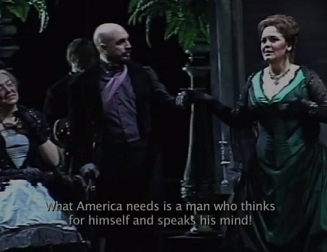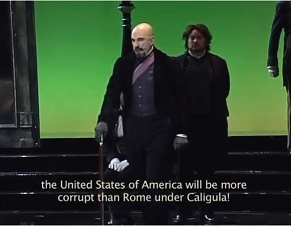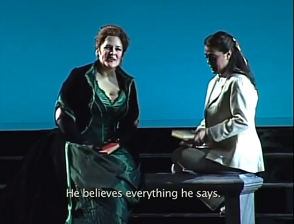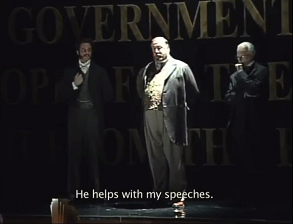|
What should we do with Democracy, that love triangle set in the Gilded-Age capital? We should read it. When we do, though, we run into two problems the original readers didn't. First, reputation. Hey, wait—there is a Great Washington Novel! Our expectations are likely to be too high. Second, the big title seems to promise a panoramic extravaganza. You know: Senator Claudius takes the wrong exit and runs his German horse over a gravedigger...and dozens of people who in normal life barely cross paths are…haplessly entangled in as many subplots…that…illuminate every social nook of every social cranny, etc. The book's not like that. It's a sardonic snow globe. Inside are a white dome, a handful of cozy or official interiors, some Virginia greenery, and a dozen-odd legislators, appointees, diplomats, lobbyists, and hangers-on. There's a farmer President who's in over his head, but he figures only peripherally, and the story largely stays away from the Capitol, and also from the newspapers. There are no civil servants, no back alleys, no Chinatown, no police, no morphine addicts, and no horse dung. The Civil War ended, there are some ruined Confederates, but there’s no sign of Reconstruction or of its failure. "Negroes" figure only as wallpaper. Indeed, the book spends more time with the wallpaper in the heroine's rented house than it does with all its freedmen and maids put together. The heroine, Mrs. Lee, is a demographic compromise. A relation of the Great Virginian, Robert E., she's also a New Yorker and (as widow) heir to a business fortune. Bored with New York, with Europe, and with hard books, in that order, she moves with her younger sister to Lafayette Square (Henry Adams lived there) to play political tourist. (It's Lafayette Square before the tour bus; it’s always empty.) Half-blind to her own motives, she gets mixed up with and taken in by a forceful, fortune-hunting sophist from Illinois, Senator Ratcliffe, who stands in for the Grant-Hayes era’s politics generally. The third side of the triangle is a shabby Virginian knight—shabby in the book’s terms—who sees through and, with the sister’s help, tries to steer Mrs. Lee away from Ratcliffe, who’s also dying to be President. (Mrs. Lee has badly underestimated the rat, mainly because he doesn’t speak French.) The story gets underway quickly, has few flat spots, and doesn't linger at the end. It isn't overfilled with officials, either. Adams has chosen his focal characters carefully. A sequence of leisurely set-pieces provides an excuse for giving close readings of them and of their exchanges. There's Mrs. Lee's parlor; riding in rural Arlington; a steamer trip to Mount Vernon; a blowout at the British embassy. There's plenty of nastiness or gamesmanship, depending on your point of view, but no weapon heavier than a cane is drawn. This is an action story—a great deal happens—in which the talk is the action. There's a third voice in the dialogues, too: Adams' narrator, who pretends not to know everything about his characters, also maintains a running commentary on them; it’s like those reflective asides that break up medieval treatises. Much of it treats the differences between how they see themselves and how others see them, and how the truth of them lies somewhere in between, though neither they nor the narrator attempt to say exactly where.
The book, published anonymously in 1880, is a refresher for those of us who’ve forgotten that unfit executives and amoral legislators weren’t invented yesterday or even in our lifetimes. Through Ratcliffe’s speechifying, Adams even attempts to explain why it’s like that and perhaps, as country and prizes grow ever bigger, cannot help but be like that. Indeed, Democracy feels like Adams’ shot at answering this: “From John and John Quincy to this…how did things go so wrong?” What could be more useful reading than that? PHOTOS - CREDIT: Scott Wheeler (YouTube Channel). Stills from "Democracy: A Sampler," from 2005 Washington National Opera production of Democracy, An American Comedy (2002) by Scott Wheeler (music) and Romulus Linney (libretto). Retrieved 11 July 2019.
0 Comments
Leave a Reply. |
AuthorI'm a freelance writer and editor who lives in Washington, D.C. Archives
March 2020
Categories |
© 2016-2019 Nathaniel Koch Email: [email protected]




 RSS Feed
RSS Feed